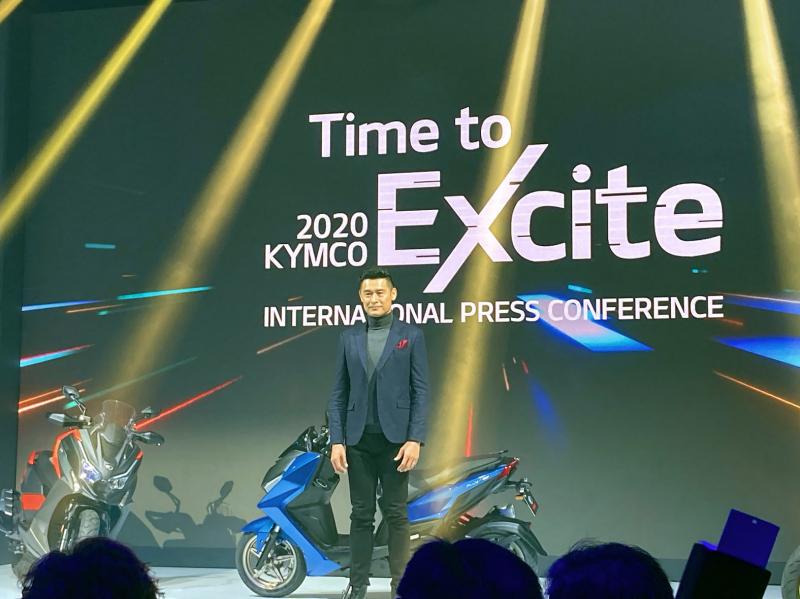Kwang Yang Motor Co (光陽工業), which sells its products under the brandname KYMCO, yesterday unveiled a new electric sport scooter, dubbed F9, to target eco-conscious riders.
The F9 is the first electric scooter designed by the company from scratch, it said.
The nation’s biggest manufacturer of gas-powered scooters, Kwang Yang ventured into electric scooters about three years ago by remaking its gas-powered “Many” and “Nice” series into electric ones. At the time, the focus was mostly on its battery charging system, called Ionex.

Photo: Lisa Wang, Taipei Times
“KYMCO’s all-new F9 model offers not only urban mobility, but also satisfies riders’ desire for a better steering experience,” company chairman Allen Ko (柯勝峰) told a global conference in Taipei.
The one-seat electric scooter performs better than a 150cc scooter, the company said, adding that most electric scooters sold on the local market are 125cc models, including those from Gogoro Inc (睿能創意).
The F9 is scheduled to hit the market next year, the company said.
Another electric motorcycle model, called RevoNEX, is to enter mass production at a factory in Italy, it added. Kwang Yang unveiled the concept vehicle at the Milan Motorcycle Show last year, targeting the global electric motorcycle market.
Aside from those two high-performance electric two-wheelers, Kwang Yang CEO Ko Chun-ping (柯俊斌) said the company is to roll out new electric scooters for the mainstream market in the near future.
The company also unveiled two new gas-powered motorcycles and one gas-powered scooter.
Thanks to tax incentives and purchase subsidies, Kwang Yang expects the domestic scooter market to rise 12.2 percent year-on-year to hit a 25-year high of 1.01 million units this year.
The COVID-19 outbreak has also stimulated demand, as people try to avoid mass transportation to reduce risks of contracting the virus, the company said.
“Government tax incentives and subsidies are the biggest drivers behind the growth,” Ko said. “Our shipments are capped by limited capacity. This year’s growth has greatly exceeded our expectations.”
As the Environmental Protection Administration is to stop subsidies for gas-powered scooters that meet its Phase 7 emissions standards from January, Ko said that scooter sales are expected to shrink by between 5 and 10 percent to between 900,000 and 950,000 units next year.
Kwang Yang expects its market share to climb to 34 percent this year from last year’s 33.4 percent, with total sales reaching 350,000 units.
Separately, Gogoro yesterday announced that China Motor Corp (中華汽車) is to join the “Powered by Gogoro Network,” making it the fifth member of the network.
Starting next year, China Motor is to offer new electric scooters under the company’s “eMoving” series that are equipped with batteries that riders can either recharge or swap for new ones.

TECH BOOST: New TSMC wafer fabs in Arizona are to dramatically improve US advanced chip production, a report by market research firm TrendForce said With Taiwan Semiconductor Manufacturing Co (TSMC, 台積電) pouring large funds into Arizona, the US is expected to see an improvement in its status to become the second-largest maker of advanced semiconductors in 2027, Taipei-based market researcher TrendForce Corp (集邦科技) said in a report last week. TrendForce estimates the US would account for a 21 percent share in the global advanced integrated circuit (IC) production market by 2027, sharply up from the current 9 percent, as TSMC is investing US$65 billion to build three wafer fabs in Arizona, the report said. TrendForce defined the advanced chipmaking processes as the 7-nanometer process or more

China’s Huawei Technologies Co (華為) plans to start mass-producing its most advanced artificial intelligence (AI) chip in the first quarter of next year, even as it struggles to make enough chips due to US restrictions, two people familiar with the matter said. The telecoms conglomerate has sent samples of the Ascend 910C — its newest chip, meant to rival those made by US chipmaker Nvidia Corp — to some technology firms and started taking orders, the sources told Reuters. The 910C is being made by top Chinese contract chipmaker Semiconductor Manufacturing International Corp (SMIC, 中芯) on its N+2 process, but a lack

NVIDIA PLATFORM: Hon Hai’s Mexican facility is to begin production early next year and a Taiwan site is to enter production next month, Nvidia wrote on its blog Hon Hai Precision Industry Co (鴻海精密), the world’s biggest electronics manufacturer, yesterday said it is expanding production capacity of artificial intelligence (AI) servers based on Nvidia Corp’s Blackwell chips in Taiwan, the US and Mexico to cope with rising demand. Hon Hai’s new AI-enabled factories are to use Nvidia’s Omnivores platform to create 3D digital twins to plan and simulate automated production lines at a factory in Hsinchu, the company said in a statement. Nvidia’s Omnivores platform is for developing industrial AI simulation applications and helps bring facilities online faster. Hon Hai’s Mexican facility is to begin production early next year and the

Who would not want a social media audience that grows without new content? During the three years she paused production of her short do-it-yourself (DIY) farmer’s lifestyle videos, Chinese vlogger Li Ziqi (李子柒), 34, has seen her YouTube subscribers increase to 20.2 million from about 14 million. While YouTube is banned in China, her fan base there — although not the size of YouTube’s MrBeast, who has 330 million subscribers — is close to 100 million across the country’s social media platforms Douyin (抖音), Sina Weibo (新浪微博) and Xiaohongshu (小紅書). When Li finally released new videos last week — ending what has